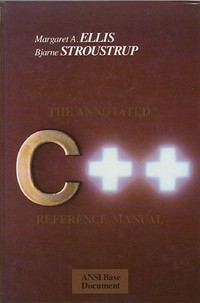Status
Call number
Library's review
Glimrende bog som giver baggrunden for de fleste konstruktioner i C++ sproget. Det er 1990-udgaven af C++, der beskrives, så bogen er noget bedaget, men måske alligevel værd at kigge i fra tid til tid.
Publication
Description
This book provides a complete reference for the C++ programming language. It consists of the C++ reference manual, approved as the base document for ANSI standardization of the language, plus annotations and commentary. The annotations and commentary discuss what is not included in the language, why certain features are defined as they are, and how one might implement particular features. The commentaries also help the reader to understand the relationships between parts of the language. Comparisons with C and examples explain the more subtle points of the language. Sixteen chapters cover the latest version of C++ including multiple inheritance, abstract classes, templates, exception handling, and more. A final chapter describes resolutions by the ANSI/ISO committee including new features such as run-time type information and namespaces. Appendices summarize the grammar and evolution of the language, and explain in detail the differences between C and C++. The Annotated C++ Reference Manual will appeal to language implementors and expert C++ programmers. 0201514591B04062001… (more)
User reviews
Subjects
Awards
Language
Original language
Physical description
ISBN
Local notes
Omslaget viser titel og forfatternavne som tekst på brun baggrund
Indskannet omslag - N650U - 150 dpi
Similar in this library
Pages
DDC/MDS
| 005.26 |
